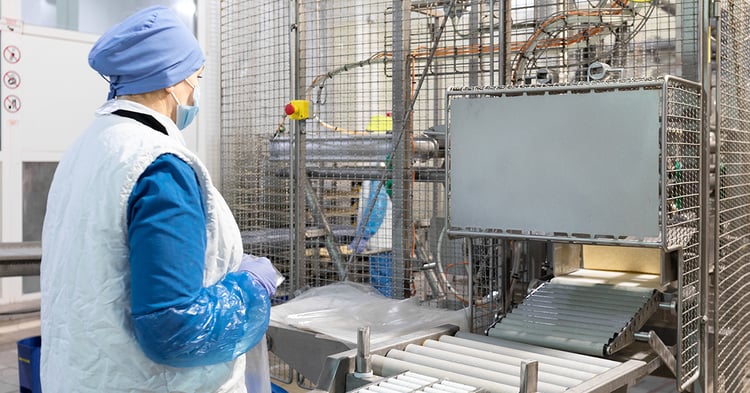![]()
Manufacturing Execution Systems (MES) offer vital tools for improving quality control in manufacturing by integrating data, ensuring traceability, enforcing SOPs, and providing real-time alerts. Despite challenges like resistance to change and high initial costs, MES enhances customer satisfaction, efficiency, and compliance, proving a valuable ROI. LiveTracking offers a 30-day free demo to showcase its benefits, supporting manufacturers in elevating quality control standards.
Table of Content
- Future Trends in Data Capture for the Food and Beverage Industry
- Integrating Data Capture with Existing Manufacturing Systems
- Best Practices for Optimizing Data Capture Processes
- Ready to Enhance Your Data Capture Strategy?
- Cross-Departmental Collaboration for Holistic Data Capture
- Glossary
- Transform your data capture strategy. Book a demo call with LiveTracking and unlock the potential for real-time, actionable insights.
Enhance Your Quality Control Now! – Discover how MES can elevate your production standards. Schedule your free demo today.
Key Features of MES that Improve Quality Control
Several key features of MES are particularly beneficial for improving quality control in manufacturing. These features include:
- Data Integration: MES can integrate data from various sources—such as ERP systems, machines, and sensors—ensuring seamless flow and availability of quality-related information.
- Traceability: MES provides detailed tracking of materials, processes, and products, allowing manufacturers to trace defects back to their source, which is vital for root-cause analysis.
- Standard Operating Procedures (SOPs): MES enables the enforcement and monitoring of SOPs across the production line, ensuring consistent quality control practices.
- Real-time Alerts: The system can send real-time alerts to operators and managers if deviations from quality standards are detected, prompting immediate corrective action.
- Reporting Tools: Advanced reporting tools within MES facilitate the generation of quality reports, enabling stakeholders to assess performance and make data-driven decisions.
These features collectively create a framework that enhances a manufacturing organization's ability to maintain quality standards while optimizing operational efficiency. The integration of data not only streamlines processes but also fosters a culture of continuous improvement by providing insights into performance trends over time. By analyzing historical data, manufacturers can identify patterns that may indicate potential quality issues before they escalate, thus allowing for proactive measures to be implemented.
Moreover, the traceability feature is particularly crucial in regulated industries, such as pharmaceuticals and food production, where compliance with stringent quality standards is mandatory. The ability to trace every component back to its origin not only aids in compliance audits but also builds consumer trust by ensuring that products meet safety and quality benchmarks. This level of transparency is increasingly becoming a competitive advantage in today’s market, where consumers are more informed and concerned about the quality of the products they purchase.
Overcoming Challenges in Quality Control with MES
While the implementation of MES can significantly enhance quality control, several challenges can arise during this process. Understanding these challenges and how to overcome them is crucial for successful integration.
One of the primary challenges is resistance to change. Employees accustomed to traditional quality control methods may be hesitant to adopt new systems and processes. To address this challenge, organizations should invest in comprehensive training programs that highlight the benefits of MES, helping staff feel more comfortable and competent in using the system. Additionally, involving employees in the decision-making process can foster a sense of ownership and reduce apprehension. By creating a collaborative environment where feedback is encouraged, organizations can ease the transition and promote a culture of continuous improvement.
Another challenge is data management. MES generates large volumes of data, which can become overwhelming if not properly managed. Organizations must establish clear strategies for data integration and governance to ensure that the quality data collected is meaningful and actionable. This includes not only implementing robust data analytics tools but also ensuring that there are standardized protocols for data entry and reporting. By doing so, organizations can enhance the accuracy of their data, leading to more informed decision-making and ultimately improving product quality.
Finally, the initial cost of implementing MES can be perceived as a barrier. However, organizations should view this as an investment in improving long-term operational efficiency and quality outputs. A well-planned rollout can also mitigate costs and ensure a smooth transition to the new system. Furthermore, organizations can explore various financing options, such as phased implementations or leveraging government grants for technology upgrades. By breaking down the investment into manageable segments, companies can alleviate financial pressure while still reaping the benefits of modernized quality control practices.
Moreover, integrating MES with existing systems can pose additional challenges. Companies often face compatibility issues with legacy systems, which can hinder the seamless flow of information. To navigate this, organizations should conduct a thorough assessment of their current infrastructure before implementation. This assessment will help identify potential integration hurdles and allow for the development of tailored solutions that ensure interoperability between systems. By prioritizing integration, companies can create a cohesive ecosystem that enhances visibility across operations and supports proactive quality management.
Measuring the ROI of MES in Quality Control Initiatives
Determining the return on investment (ROI) associated with MES in quality control is a critical consideration for manufacturers. Several factors contribute to the ROI, making it essential to adopt a comprehensive evaluation approach.
Firstly, improved quality control processes often result in reduced scrap and rework, leading to significant cost savings. For instance, by detecting defects earlier in the production process, companies can minimize the costs associated with correcting those defects later down the line. This proactive approach not only saves money but also enhances the overall efficiency of the production line, allowing for a more predictable and stable output. Additionally, the data collected through MES can be analyzed to identify recurring issues, enabling manufacturers to implement corrective actions that prevent future defects, thereby further amplifying cost savings.
Secondly, enhanced quality leads to greater customer satisfaction and loyalty. Satisfied customers are more likely to return and provide referrals, translating into increased sales and a stronger market position. Moreover, in today’s competitive landscape, where consumers have access to a plethora of choices, maintaining high-quality standards can serve as a key differentiator. Companies that consistently deliver superior products are better positioned to command premium pricing and foster long-term relationships with their clients, which can significantly contribute to sustained revenue growth.
Lastly, the efficiency gained through MES systems can lead to higher throughput and better resource utilization. As production processes become more efficient and streamlined, the potential for increased profitability rises along with it, effectively enhancing the overall ROI of MES implementation. Furthermore, the integration of MES allows for real-time data analysis, which empowers manufacturers to make informed decisions quickly. This agility not only helps in optimizing production schedules but also in responding to market demands more effectively, ensuring that resources are allocated where they are most needed.
In addition to these benefits, the implementation of MES can also facilitate compliance with industry regulations and standards. Many sectors, such as pharmaceuticals and food production, are subject to stringent quality control requirements. By automating data collection and reporting through MES, manufacturers can ensure that they are consistently meeting these standards, thereby avoiding costly fines and enhancing their reputation in the market. This aspect of MES not only contributes to ROI but also builds trust with consumers and stakeholders alike.
Manufacturing Execution Systems play a pivotal role in enhancing quality control within the manufacturing sector. From real-time monitoring and analysis to addressing challenges and measuring ROI, MES provides manufacturers with the tools needed to ensure high-quality outputs consistently. By leveraging these advantages, organizations can not only meet but exceed industry standards, ultimately leading to improved operational performance and customer satisfaction.
Take Your Manufacturing Quality Control to the Next Level with LiveTracking
Ready to enhance your manufacturing quality control and achieve a remarkable 15% increase in equipment efficiency? LiveTracking is here to show you how. Schedule a quick discovery call with us and take advantage of a free 30-day full demo of our streamlined solutions. Let's explore the opportunities that await your manufacturing operations. Don't miss out on the chance to simplify the tracking of critical statistics and see firsthand the difference LiveTracking can make. Schedule a quick Demo call within the next two weeks and start your journey towards enhanced operational performance and customer satisfaction.
Regulatory Compliance
In regulated industries, MES ensures consistent compliance with quality standards, avoiding fines and enhancing market reputation.
Boost Efficiency by 15%! – Try LiveTracking’s 30-day demo and see the impact on your manufacturing quality control.
Glossary
- MES (Manufacturing Execution System): A system that manages and monitors manufacturing processes in real time to enhance production efficiency and quality control.
- Data Integration: The process of combining data from multiple sources to provide unified information.
- Traceability: Ability to track the origin and history of materials and processes in manufacturing.
- Standard Operating Procedures (SOPs): Established procedures to maintain quality and consistency in manufacturing processes.
- Real-time Alerts: Instant notifications triggered by the system when a process deviation is detected.
- Reporting Tools: Tools within MES used to generate quality performance reports for decision-making.
- ROI (Return on Investment): A measure of the profitability or cost-benefit of an investment, in this case, MES implementation in quality control.


